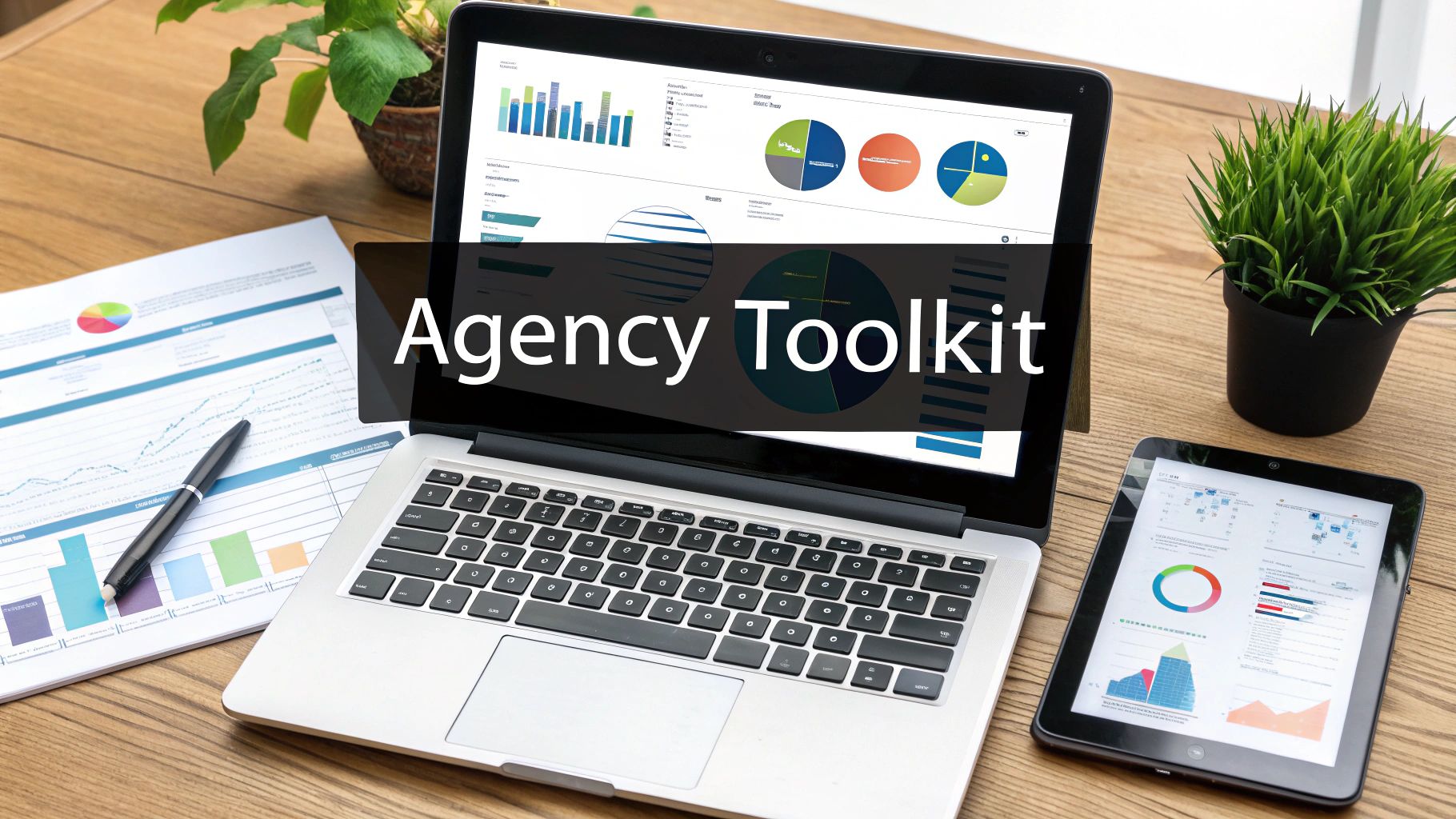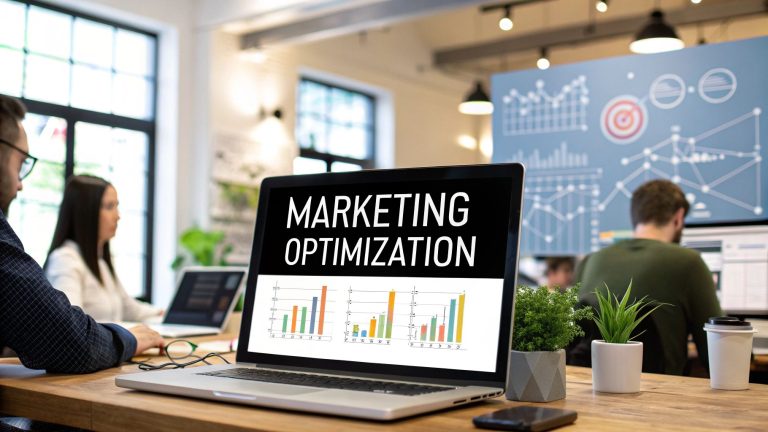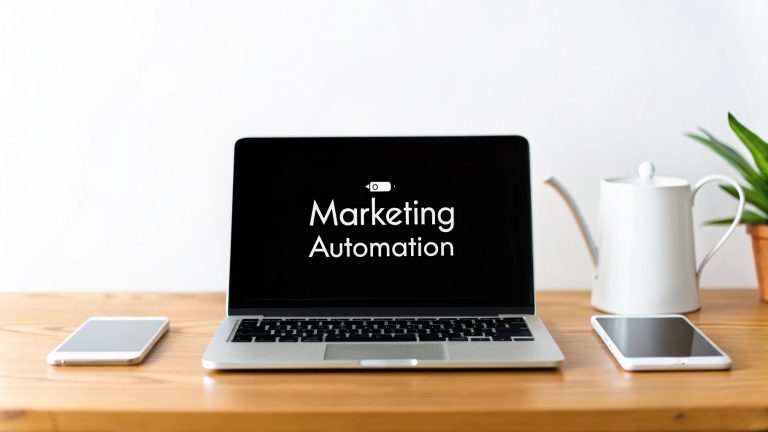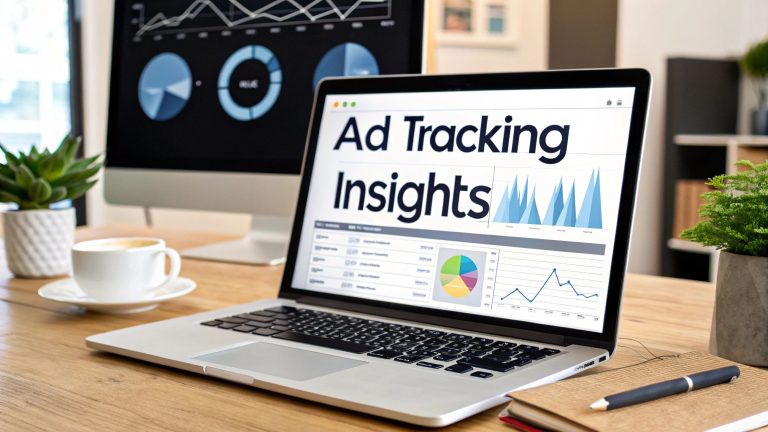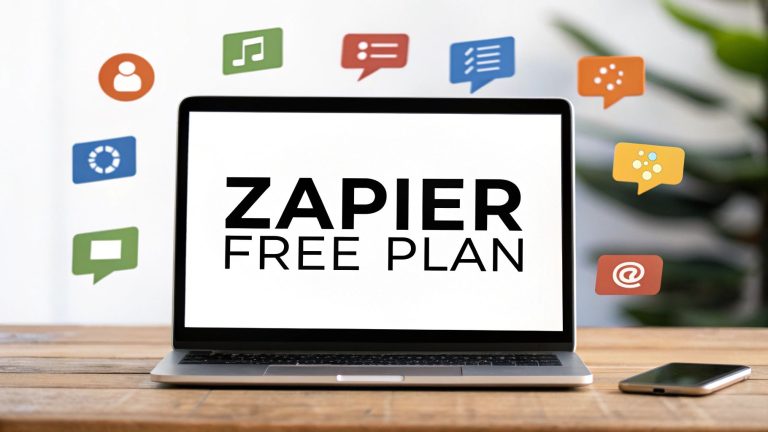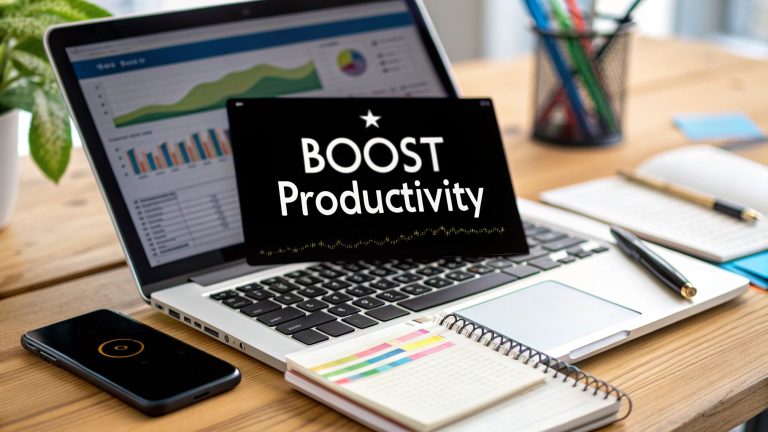Top Marketing Tools for Agencies in 2025
In the fast-paced world of digital marketing, agencies are the navigators guiding clients through constantly shifting landscapes. Success isn't just about strategy; it's about having the right technology to execute flawlessly, measure impact, and scale efficiently. The right marketing tools for agencies act as a force multiplier, automating tedious tasks, providing deep insights, and freeing up your team to focus on high-value creative and strategic work.
But with a sea of software options, building the perfect tech stack can feel overwhelming. This guide cuts through the noise. We've compiled a definitive list of 12 essential marketing tools specifically chosen to address the core challenges agencies face—from client reporting and lead generation to project management and campaign execution.
Each platform reviewed here includes a detailed breakdown of its key features, target use cases, and transparent pricing information to help you make an informed decision. You will find screenshots and direct links for every tool, allowing for quick evaluation. This resource is designed for small to mid-sized agencies, digital marketing professionals, and sales teams managing multiple client accounts or complex campaign workflows. To stay competitive and leverage the latest innovations, agencies should also explore a comprehensive list of the 12 Best AI Powered Marketing Tools for 2025 to further enhance their capabilities. Whether you're a boutique firm or a growing powerhouse, these platforms will help you deliver exceptional results and stay ahead of the curve in 2025.
1. LeadSavvy Pro
As our featured choice, LeadSavvy Pro stands out as an indispensable tool for any agency managing Facebook Lead Ad campaigns. It directly addresses and solves a significant operational bottleneck: the manual retrieval of leads. Instead of cumbersome, time-consuming CSV downloads, this platform automates the entire process, syncing lead data from Facebook Lead Forms directly into a connected Google Sheet or its integrated CRM in real-time. This automation is a game-changer for agency efficiency and client success.
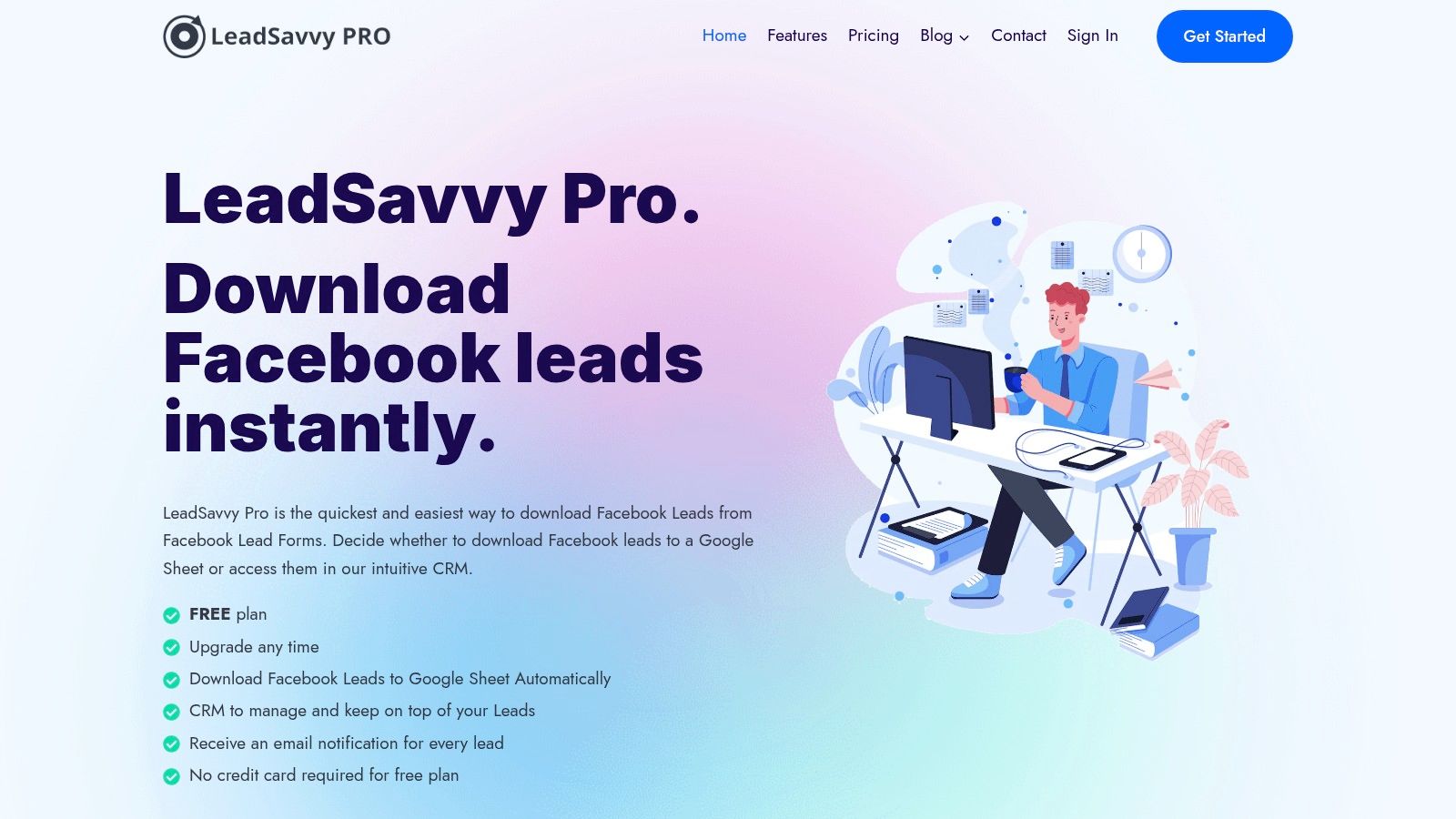
This immediate data transfer empowers agencies to act on new leads instantly. Real-time email notifications alert sales or account management teams the moment a prospect shows interest, dramatically shortening response times and increasing the likelihood of conversion. For agencies juggling multiple clients, this swift, automated workflow ensures no lead is ever left behind, directly enhancing campaign ROI and demonstrating clear value.
Key Agency-Focused Features
- Automated Lead Sync: Eliminates the need for manual CSV downloads by instantly pushing Facebook lead data to Google Sheets or its built-in CRM. This frees up billable hours and reduces the risk of human error.
- Real-Time Notifications: Customizable email alerts for new leads enable rapid follow-up, a critical factor in converting inbound interest from ad campaigns.
- Intuitive Setup: The user-friendly interface and step-by-step video tutorials make onboarding seamless, even for non-technical team members. An agency can connect a new client's Facebook page and have leads routing in minutes.
- Centralized Management: Consolidates all Facebook lead data into a single, accessible location. This simplifies reporting and provides a clear overview of campaign performance across different clients.
Practical Implementation and Use Case
A digital marketing agency running lead generation campaigns for a local real estate client can use LeadSavvy Pro to instantly route new property inquiries to the client's sales team. When a user fills out a Facebook Lead Form, their contact details appear in a shared Google Sheet and an email is sent to the assigned agent. This removes any delay, allowing the agent to contact a warm lead within minutes of their inquiry, significantly improving the chances of scheduling a viewing. To explore how it stacks up against other platforms, you can discover more about various lead generation tools.
Website: https://leadsavvy.pro
| Feature Analysis | LeadSavvy Pro |
|---|---|
| Primary Use Case | Automating Facebook Lead Form data transfer to Google Sheets/CRM. |
| Best For | Agencies and SMBs seeking a simple, cost-effective solution for Facebook lead management. |
| Pricing | A free plan is available with no credit card required. Paid plans offer advanced features and support for multiple accounts, making it scalable for growing agencies. |
| Key Strengths | Simplicity and Speed: Its focused approach does one thing exceptionally well, providing a reliable and fast connection between Facebook and your lead database without the complexity of larger automation platforms. |
| Potential Limitations | The platform is currently specialized for Facebook Lead Forms and does not integrate with other lead sources like LinkedIn or website forms. Larger agencies may find the multi-account management features are only available on paid tiers. |
2. HubSpot – Marketing Hub
HubSpot’s Marketing Hub has cemented its position as a go-to platform by bundling a powerful CRM with a comprehensive suite of marketing automation tools. It's designed as an all-in-one solution, allowing agencies to manage everything from lead capture and email marketing to detailed campaign analytics and client reporting from a single, unified interface. This integration is its core strength, eliminating the data silos that often plague multi-tool marketing stacks.
For agencies, this means creating sophisticated, multi-touch campaigns is streamlined. You can build landing pages, design forms, and launch ad campaigns directly within the platform, with all data feeding back into the central CRM. This creates a single customer view, making it easier to demonstrate ROI to clients and facilitate a smooth handoff between marketing and sales teams.
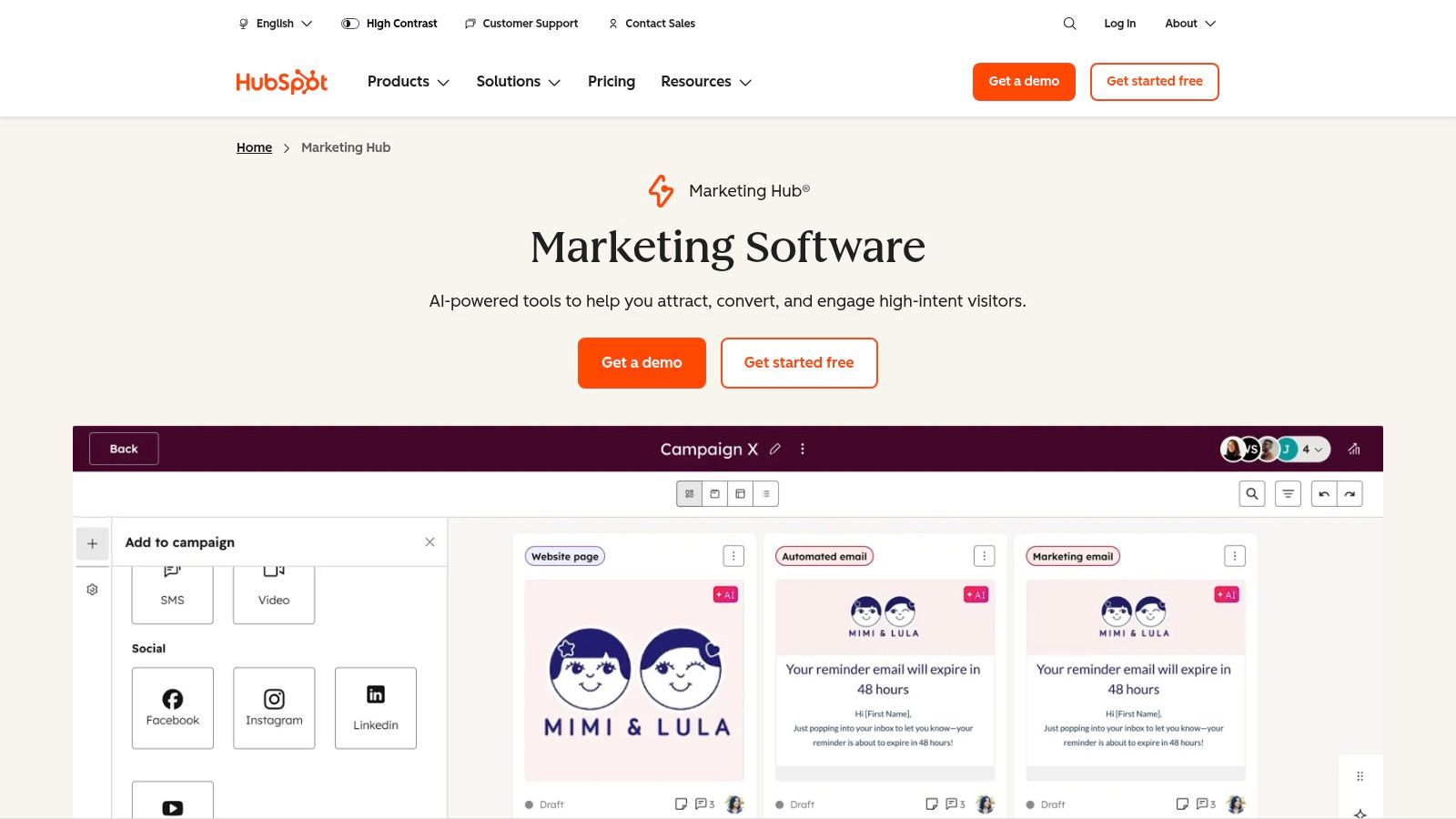
Why It’s a Top Tool for Agencies
HubSpot excels in providing a scalable framework that grows with your clients. Its visual workflow builder allows for the creation of complex customer journeys, while its robust reporting features, especially on Pro and Enterprise tiers, enable deep dives into attribution and campaign performance. The extensive app marketplace and HubSpot Academy provide agencies with the resources and integrations needed to tackle unique client challenges.
Key Features:
- Integrated CRM: Syncs all marketing activities with customer profiles for a complete lifecycle view.
- Automation Workflows: Build visual customer journeys for email nurturing, lead scoring, and internal notifications.
- Asset Management: Create, manage, and optimize landing pages, blogs, forms, and CTAs.
- Reporting & Analytics: Track full-funnel metrics with customizable dashboards and attribution reporting.
Our Take:
The mandatory onboarding for higher tiers can be a hurdle, and the per-seat/contact pricing can escalate quickly. However, for agencies looking for a truly integrated platform that simplifies client management and reporting, HubSpot is one of the best marketing tools for agencies available. You can learn more about its CRM capabilities in our detailed guide to the best CRMs for marketing agencies.
Website: https://www.hubspot.com/products/marketing
3. Semrush
Semrush has evolved from a powerful SEO tool into a comprehensive end-to-end search marketing suite essential for agencies. It offers a holistic view of a client's online visibility, covering SEO, PPC, content marketing, and competitive intelligence within a single platform. This integrated approach allows agencies to develop data-driven strategies that span multiple digital channels, moving beyond siloed tactics.
For agencies, the platform simplifies complex workflows like competitive analysis and keyword gap identification. You can track clients’ search rankings, audit their websites for technical SEO issues, and analyze their backlink profiles all in one place. The Agency Growth Kit add-on further enhances its utility by providing lead generation tools, white-label client portals, and a CRM, making it one of the most agency-centric marketing tools for agencies.
Why It’s a Top Tool for Agencies
Semrush excels at providing agencies with the extensive data and reporting capabilities needed to prove value and drive results. The white-label reporting features allow for the creation of professional, branded client reports directly from the platform. Furthermore, the extensive toolkits for SEO, paid advertising, and content marketing mean agencies can manage the entire search marketing lifecycle without needing to switch between multiple specialized tools.
Key Features:
- Comprehensive SEO Toolkit: Includes keyword research, rank tracking, site audits, and backlink analysis.
- PPC & Competitive Research: Analyze competitor ad copy, budgets, and Product Listing Ads (PLAs).
- Content Marketing Platform: Offers tools for topic research, content optimization, and performance tracking.
- Agency Growth Kit: Provides white-label reporting, client portals, a CRM, and lead generation capabilities.
Our Take:
The sheer volume of features can create a steep learning curve for new users, and the cost can add up with extra modules and the Agency Growth Kit. However, for agencies that need a deep, data-rich platform for managing and reporting on SEO, PPC, and content marketing campaigns, Semrush is an indispensable asset.
Website: https://www.semrush.com
4. Ahrefs
Ahrefs is an industry-leading SEO toolset renowned for its massive backlink index and robust competitor analysis capabilities. It empowers agencies to dissect any website's organic search performance, uncover high-value keywords, and audit technical SEO health. Its strength lies in providing comprehensive, actionable data that forms the backbone of successful client SEO campaigns, from initial strategy to ongoing performance reporting.
For agencies managing SEO retainers, Ahrefs offers a centralized platform for nearly every critical task. You can research content gaps by analyzing top-performing competitor pages, track daily keyword ranking changes across multiple locations and devices, and run comprehensive site crawls to identify and prioritize technical issues. This all-in-one approach streamlines workflows, making it one of the most indispensable marketing tools for agencies focused on organic growth.
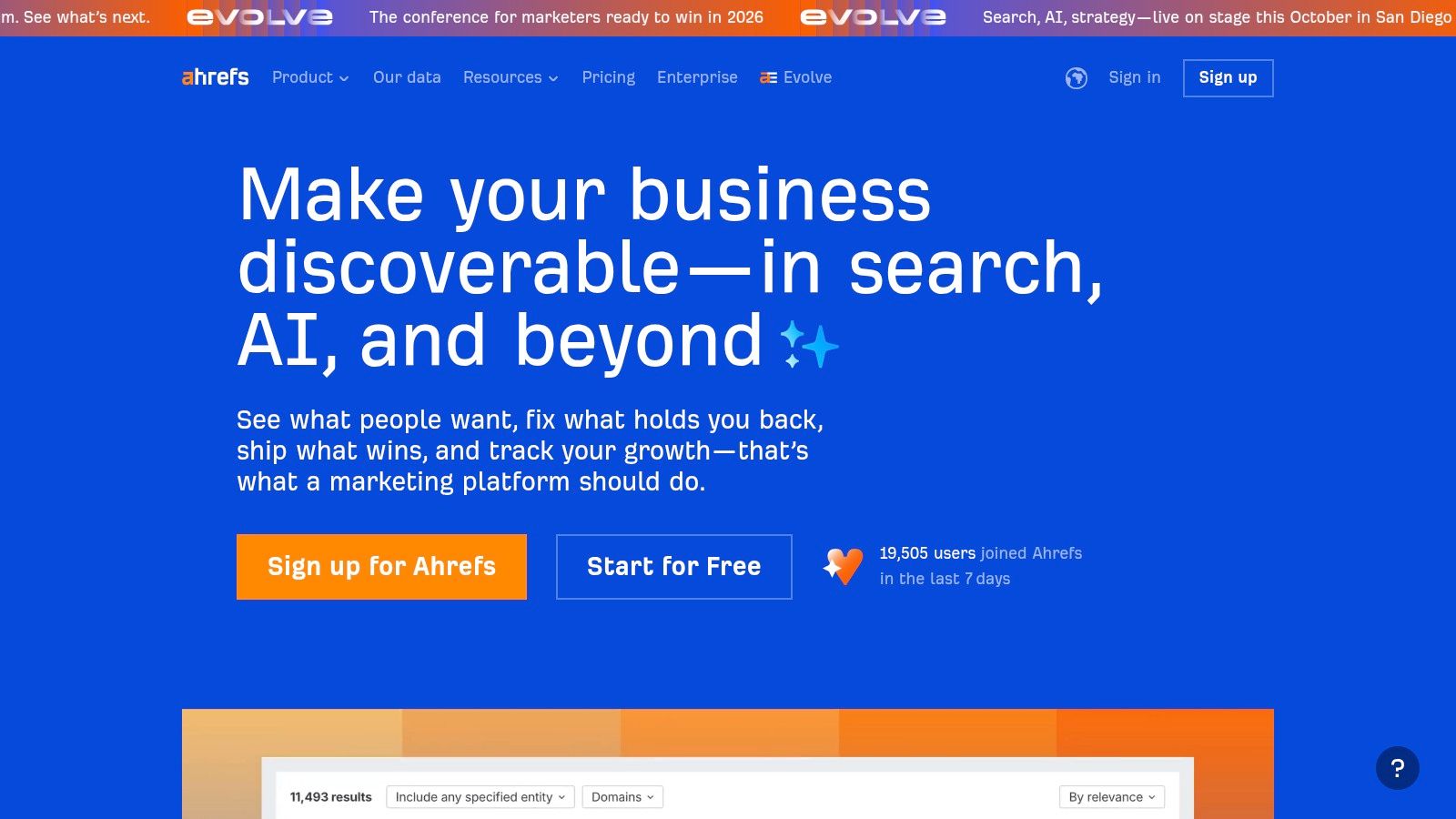
Why It’s a Top Tool for Agencies
Ahrefs excels at providing the deep competitive intelligence that agencies need to build and justify their SEO strategies to clients. The Site Explorer tool gives a clear view of a competitor’s backlink profile, top organic keywords, and estimated traffic value. This data is crucial for benchmarking, identifying link-building opportunities, and setting realistic performance expectations for client campaigns. The platform is built to handle large portfolios, offering enterprise-level controls for managing multiple client projects efficiently.
Key Features:
- Site Explorer: Delivers in-depth backlink profiles, organic traffic data, and paid search metrics for any URL.
- Keywords Explorer: Provides comprehensive keyword research with accurate difficulty scores, search volume, and click data.
- Site Audit: Crawls client websites to detect over 100 technical and on-page SEO issues, with AI-assisted recommendations.
- Rank Tracker: Monitors keyword rankings across desktop and mobile in virtually any location, with extensive historical data.
Our Take:
The pricing model, which includes a base subscription plus additional per-user charges, can become expensive for larger teams. Furthermore, you cannot purchase individual tools separately. Despite this, its best-in-class backlink index and reliable, fresh data make Ahrefs a non-negotiable tool for any agency serious about delivering top-tier SEO results for clients.
Website: https://ahrefs.com
5. Sprout Social
Sprout Social provides a comprehensive social media management solution built for the complexities of agency life. It centralizes publishing, engagement, analytics, and social listening into one platform, allowing teams to manage multiple client accounts efficiently. Its core strength lies in its collaborative workflows, which streamline everything from content approvals to response management, ensuring brand consistency and quick turnarounds.
For agencies, this means gaining complete control over client social media strategies from a single dashboard. You can schedule content across all major networks, manage incoming messages in a unified inbox with team assignments, and generate presentation-ready reports that clearly demonstrate performance and ROI. This level of organization is crucial when handling diverse client portfolios.
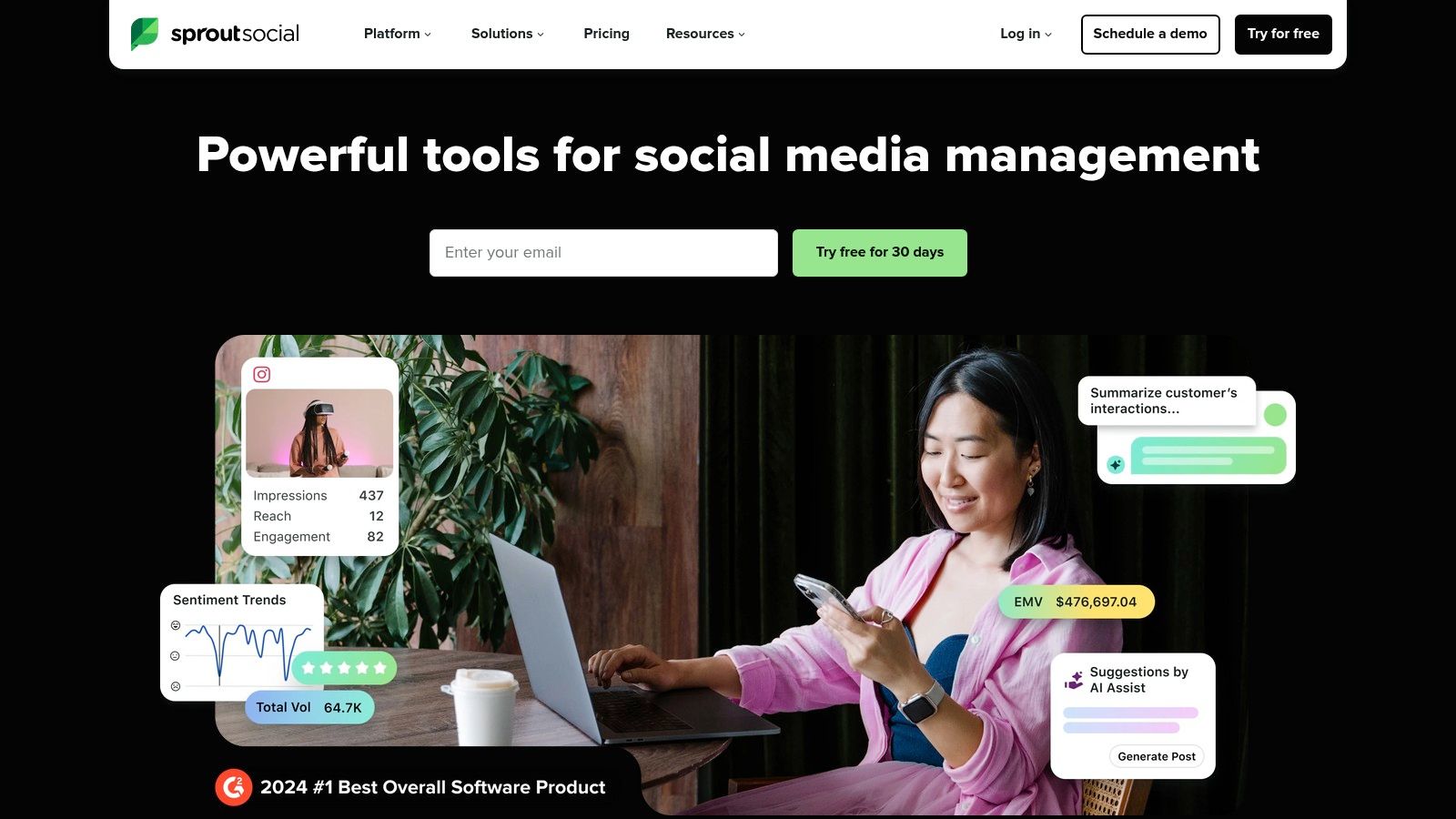
Why It’s a Top Tool for Agencies
Sprout Social excels at scaling social media operations while maintaining granular control. The platform’s robust permission levels and approval workflows are ideal for managing multi-stakeholder projects involving clients and internal teams. Its advanced analytics suite provides deep insights into audience demographics, content performance, and competitive landscapes, equipping agencies with the data needed to refine strategies and prove their value.
Key Features:
- Unified Smart Inbox: Consolidates all social messages into a single stream with collaborative tools for assignments and tracking.
- Publishing & Scheduling: Plan, draft, and schedule content across multiple networks with a visual calendar and AI assistance.
- Advanced Reporting: Generate customizable reports on post performance, audience growth, team productivity, and competitive insights.
- Team & Client Governance: Set specific user permissions and create approval workflows to manage content quality and brand voice.
Our Take:
The per-seat pricing can become a significant expense for larger agencies, and some of the most powerful features like advanced listening are gated behind higher-tier plans or add-ons. Despite this, for agencies that prioritize collaboration, sophisticated analytics, and a polished user interface, Sprout Social is one of the most powerful and intuitive marketing tools for agencies specializing in social media.
Website: https://sproutsocial.com
6. Google Marketing Platform
Google Marketing Platform consolidates Google’s powerful advertising and analytics tools into a unified suite, offering agencies an interconnected ecosystem for campaign management, measurement, and optimization. It bridges free, indispensable tools like Google Analytics 4 and Google Tag Manager with enterprise-grade solutions such as Campaign Manager 360 and Display & Video 360, providing a scalable path for clients of all sizes. This deep integration is its primary advantage, allowing for seamless data flow from ad impression to conversion.
For agencies, this means managing complex, multi-channel campaigns becomes far more efficient. You can deploy tracking pixels via Tag Manager, analyze user behavior in GA4, and manage large-scale programmatic and search campaigns through the 360 suite. The native connection to Google Ads and BigQuery allows for sophisticated audience segmentation and advanced data warehousing, giving agencies the tools to deliver deep, data-driven insights to clients.
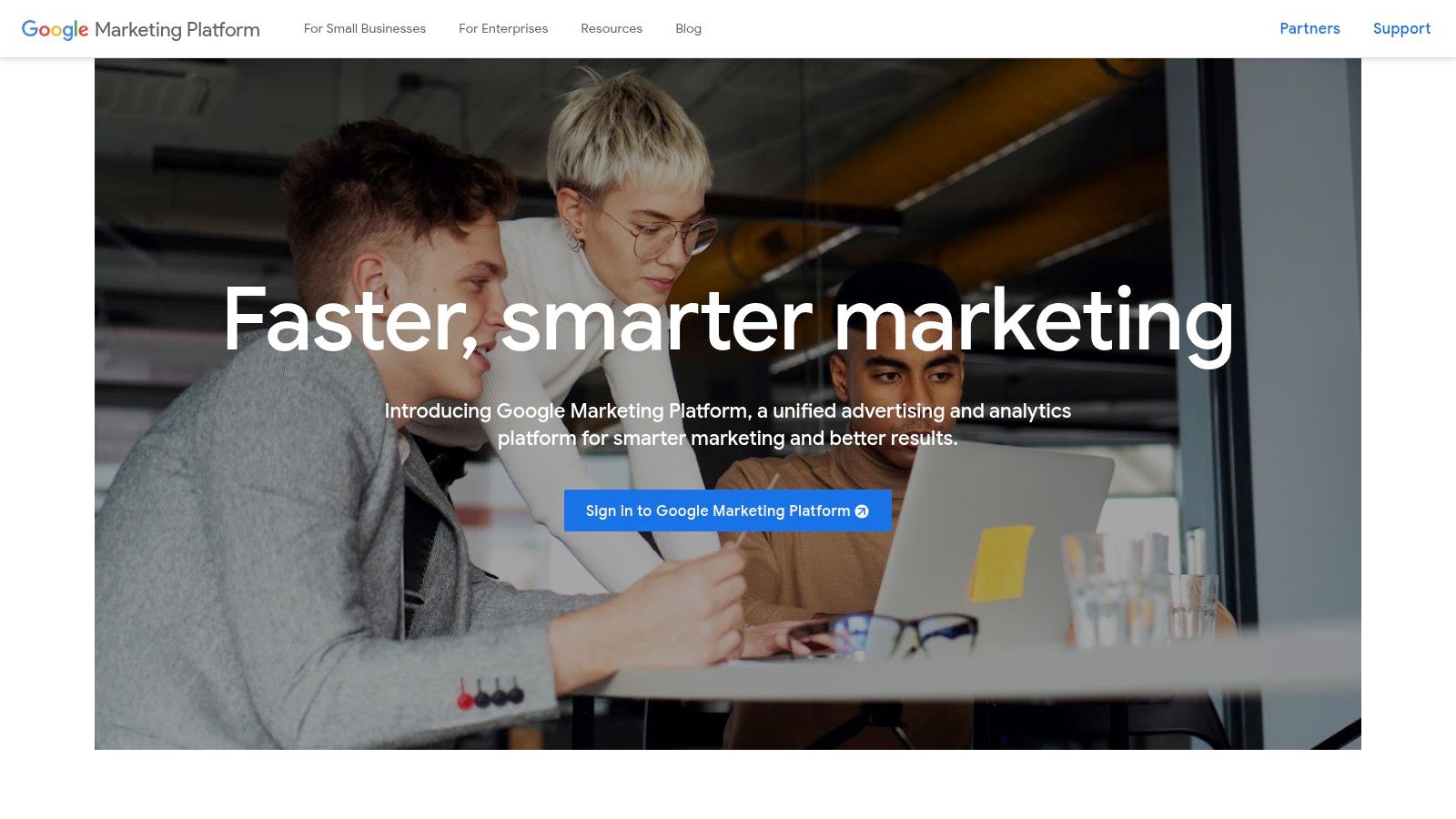
Why It’s a Top Tool for Agencies
Google Marketing Platform excels at providing a comprehensive, end-to-end view of the customer journey within Google's vast ecosystem. The availability of free entry-level tools makes it accessible for smaller clients, while the 360 suite provides the raw power needed for enterprise-level accounts. The extensive training available through Google Skillshop also helps agency teams stay certified and up-to-date on platform capabilities.
Key Features:
- Unified Measurement: Combines Google Analytics 4 for web/app analytics and Tag Manager for streamlined tag deployment.
- Enterprise Ad Management: Includes Search Ads 360, Display & Video 360, and Campaign Manager 360 for centralized media operations.
- Native Integrations: Seamlessly connects with Google Ads, BigQuery, and other Google Cloud products for advanced analysis.
- Scalable Solutions: Offers a clear upgrade path from free tools to the comprehensive 360 suite for growing clients.
Our Take:
The enterprise pricing for 360 products is not public and can be a significant investment, while GA4 presents a steep learning curve for teams accustomed to Universal Analytics. However, for agencies managing significant ad spend within the Google ecosystem, it is an unparalleled suite of marketing tools for agencies that provides unmatched data integration and control.
Website: https://marketingplatform.google.com
7. Meta Business Suite & Ads Manager
As the official, native platform for managing Facebook and Instagram, Meta Business Suite is an indispensable tool for any agency offering social media or paid advertising services. It centralizes control over pages, inboxes, content scheduling, and e-commerce functionalities, providing a unified dashboard for all client assets. This native integration ensures agencies have first-party access to the most advanced ad formats, placements, and audience data.
The platform's power lies in the granularity of its Ads Manager, which allows for the creation of highly specific audience segments based on demographics, interests, and behaviors. For agencies, this means you can build, launch, and optimize complex ad campaigns with precise budget controls and A/B testing capabilities. All performance data feeds directly into its reporting suite, enabling clear, direct analysis of ROI for clients without relying on third-party tools.
Why It’s a Top Tool for Agencies
Meta Business Suite excels at multi-client management, allowing agencies to securely request and manage access to client assets without sharing login credentials. The platform's direct integration with Facebook Pixel and the Conversions API provides the most accurate data for tracking user actions and optimizing campaigns for conversions. While the interface can be complex, mastering it is non-negotiable for delivering top-tier paid social results.
Key Features:
- Unified Asset Management: Manage Facebook Pages, Instagram accounts, and ad accounts from one central hub.
- Advanced Ad Targeting: Build and save granular audiences for precise campaign targeting and retargeting.
- Content Scheduling & Inbox: Natively schedule posts and stories, and manage all messages and comments in a single inbox.
- Performance Analytics: Access detailed reporting on ad performance, audience insights, and page growth.
Our Take:
The platform itself is free to use, but the primary cost is the ad spend, which is variable. Agencies may face occasional bugs and frustratingly limited support, but its direct access to Meta’s ecosystem makes it one of the most essential marketing tools for agencies running paid social campaigns. There is no substitute for the native toolset.
Website: https://business.facebook.com
8. Mailchimp
Mailchimp is a cornerstone of email marketing, renowned for its user-friendly interface and robust template library that makes launching campaigns straightforward. For agencies, it serves as a reliable, scalable platform to manage multiple client email lists and automation sequences. Its core strength lies in its simplicity and accessibility, allowing teams to deploy sophisticated email strategies without a steep learning curve or extensive technical overhead.
Agencies can manage distinct client audiences under a single account, using role-based access to securely grant client or team member permissions. This centralized management simplifies operations, from designing on-brand newsletters with the drag-and-drop builder to setting up automated welcome series or abandoned cart reminders. All campaign data is clearly presented, making it easy to report on open rates, click-throughs, and conversions.
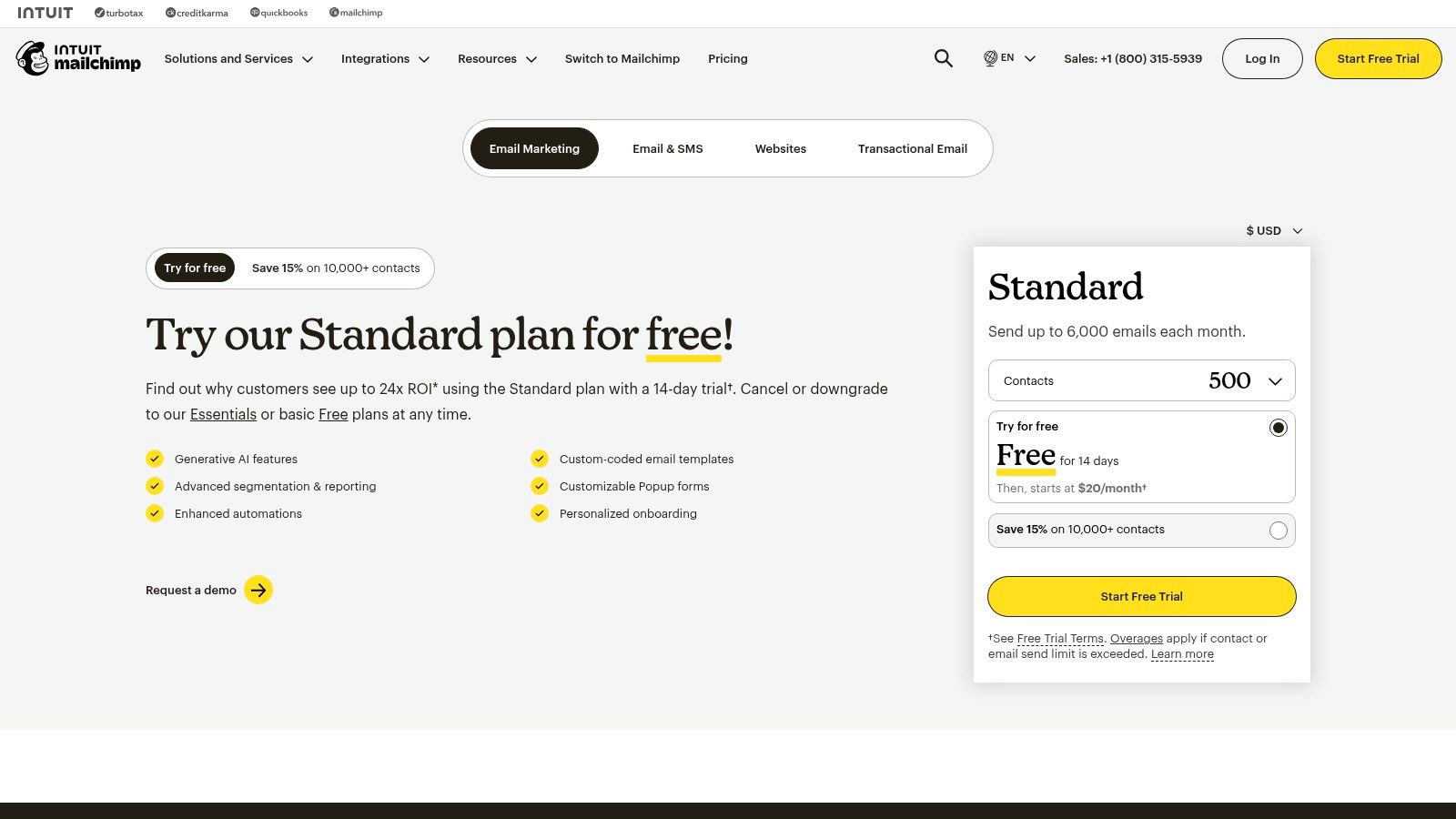
Why It’s a Top Tool for Agencies
Mailchimp's ability to scale from a generous free plan to feature-rich premium tiers makes it a versatile choice. Agencies can start small clients on a free or essentials plan and upgrade as their needs grow. Its vast integration marketplace, including direct connections to major e-commerce platforms like Shopify and WooCommerce, allows agencies to create a connected marketing ecosystem that drives real business results for their clients.
Key Features:
- Drag-and-Drop Builder: Intuitive email editor with a deep library of customizable templates and multivariate testing.
- Automation & Journeys: Build customer workflows for onboarding, re-engagement, and transactional emails with advanced segmentation.
- Audience Management: Manage multiple client lists with tags, groups, and role-based access for secure collaboration.
- Integrations & Reporting: Connects with hundreds of apps and provides clear, actionable reports on campaign performance.
Our Take:
The pricing model, which charges for both total contacts and email sends, can lead to unexpected overage fees if not monitored closely. Additionally, the most powerful automation and predictive features are reserved for higher-tier plans. Still, for agencies needing a dependable and easy-to-deploy email platform, Mailchimp remains one of the best marketing tools for agencies.
Website: https://mailchimp.com/pricing
9. Canva for Teams
Canva for Teams has evolved from a simple design tool into an essential content creation platform for agencies that need to produce high-quality, on-brand assets at scale. It centralizes design workflows, allowing teams to create everything from social media graphics and ad creatives to client proposals and presentations using a shared asset library. The platform's core strength lies in its ability to empower non-designers to produce professional-looking content quickly, freeing up specialized design resources for more complex tasks.
For agencies, this means rapid turnaround times for daily content needs. The Brand Kit feature ensures every asset adheres to client-specific fonts, colors, and logos, maintaining brand consistency across all touchpoints. This streamlined process is invaluable for managing multiple client accounts, each with its unique visual identity, and facilitates smoother collaboration between account managers, copywriters, and designers.
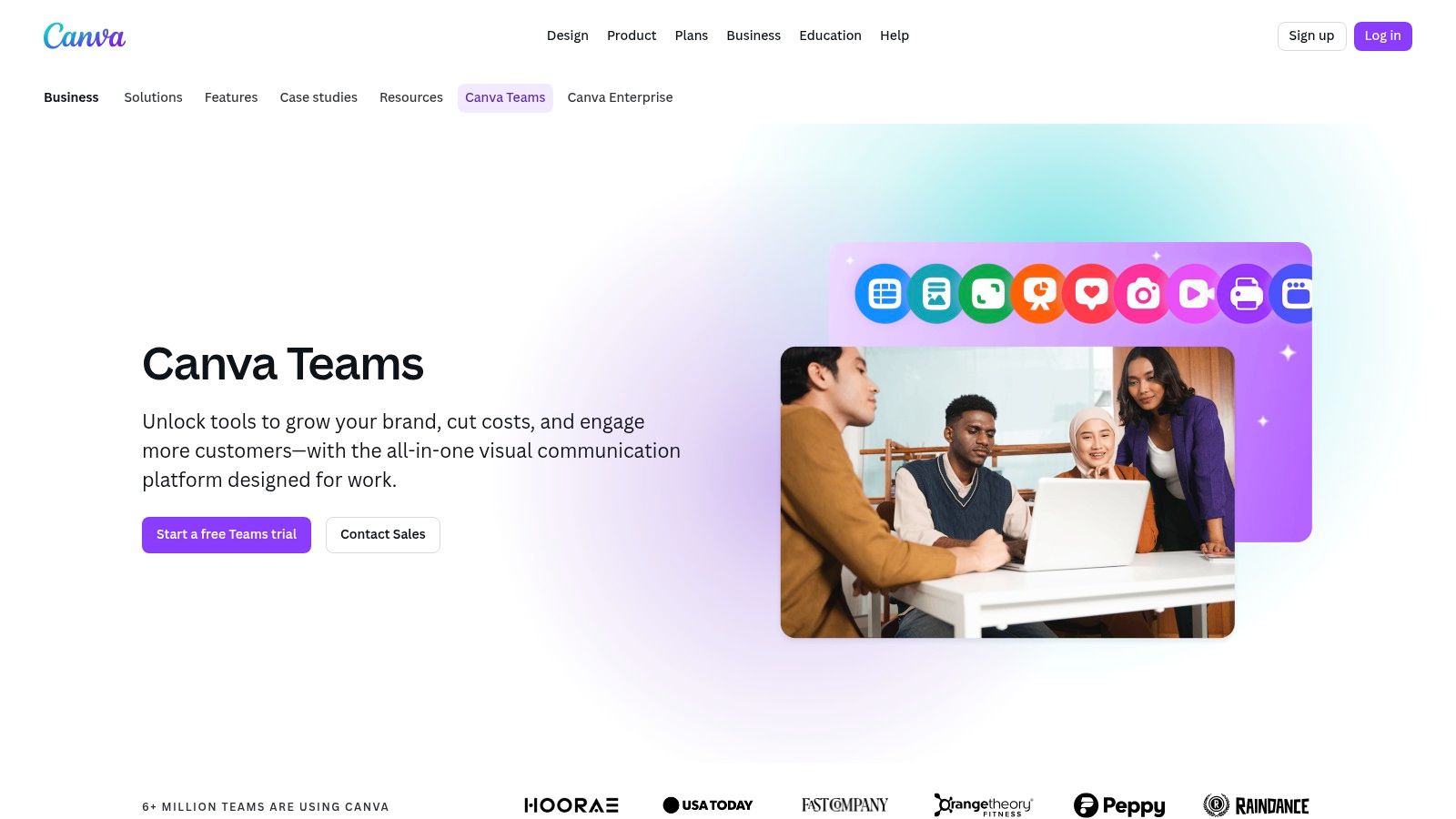
Why It’s a Top Tool for Agencies
Canva for Teams excels at democratizing design, making it one of the most versatile marketing tools for agencies managing high-volume content production. Its real-time collaboration and approval workflows allow clients to leave feedback directly on designs, eliminating confusing email chains. The massive library of templates and stock assets, combined with new AI-powered "Magic Studio" features, provides a powerful starting point for nearly any creative request, drastically reducing creation time.
Key Features:
- Brand Kits: Centrally manage client logos, color palettes, and fonts for consistent branding.
- Team Collaboration: Real-time editing, commenting, and role-based permissions for designers, managers, and clients.
- Template & Asset Libraries: Access millions of templates, stock photos, videos, and graphics.
- Approval Workflows: Streamline the review process by allowing designated approvers to sign off on designs directly.
Our Take:
While recent price increases and minimum user counts for Teams plans can be a drawback, the platform's efficiency gains are undeniable. It's an indispensable tool for agencies focused on social media, content marketing, and digital advertising, where the speed of asset creation is a competitive advantage.
Website: https://www.canva.com/teams
10. Zapier
Zapier is the connective tissue of the modern marketing stack, an indispensable automation platform that allows agencies to link disparate tools without writing a single line of code. It empowers teams to build custom workflows, or "Zaps," that move information between apps automatically. This is crucial for agencies juggling multiple clients, each with their own unique set of software for CRM, ads, project management, and reporting.
For an agency, Zapier solves the persistent problem of data fragmentation. You can instantly send new leads from a Facebook Lead Ad to a client’s specific CRM, notify a Slack channel when a new project is created in Asana, or add new email subscribers to a Google Sheet for tracking. This eliminates countless hours of manual data entry, reduces human error, and ensures critical information gets where it needs to go in real-time.
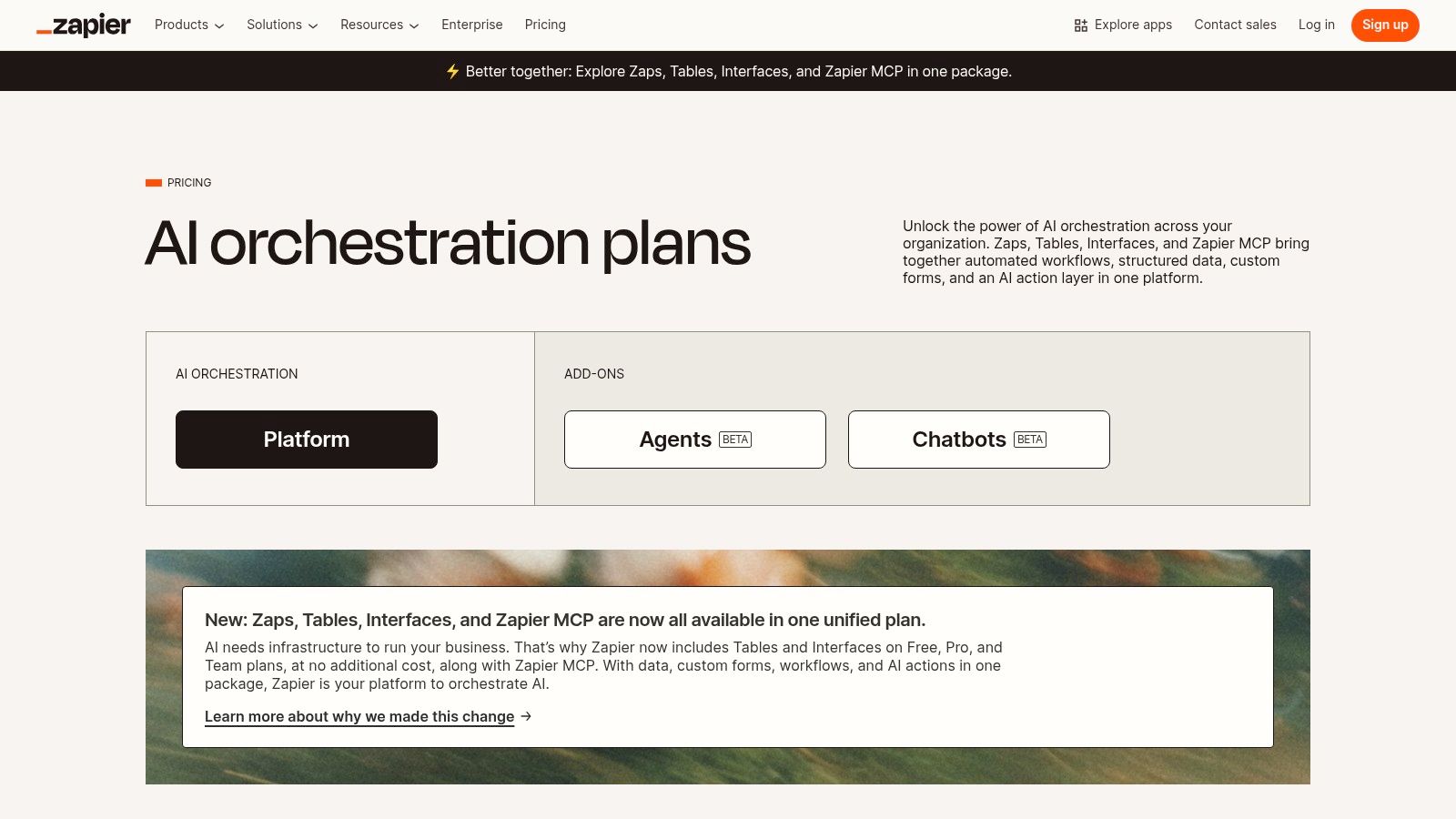
Why It’s a Top Tool for Agencies
Zapier's strength lies in its enormous library of over 5,000 app integrations, making it compatible with almost any tool a client might use. Its shared workspaces and connection management features are built for team collaboration, allowing agencies to securely manage client credentials and workflows. The ability to create multi-step Zaps with conditional logic enables the development of sophisticated, custom automation solutions tailored to specific client needs.
Key Features:
- No-Code Workflows: Build multi-step "Zaps" with conditional paths to automate complex processes.
- Massive Integration Library: Connects thousands of marketing, sales, and productivity applications.
- Shared Workspaces: Manage client connections and team access from a centralized, secure dashboard.
- Advanced Admin Controls: Higher-tier plans offer enhanced security, user provisioning, and oversight.
Our Take:
The task-based pricing can become expensive for high-volume workflows, and agencies should be mindful of potential API limits from connected apps. However, for its sheer versatility and time-saving potential, Zapier is one of the most essential marketing tools for agencies looking to operate efficiently at scale. You can find more tips in our guide on implementing marketing automation best practices.
Website: https://zapier.com/pricing
11. AppSumo
AppSumo isn't a single tool but a dynamic marketplace that offers lifetime deals (LTDs) on a rotating selection of software, making it a goldmine for agencies looking to build a cost-effective marketing stack. Instead of committing to steep monthly subscriptions, agencies can acquire licenses for emerging SEO, social media, AI, and content creation tools with a one-time payment. This model is perfect for experimenting with new technologies or equipping the team with niche tools for specific client projects without long-term financial risk.
For agencies, this provides an incredible opportunity to discover up-and-coming platforms before they hit the mainstream. You can build a diverse toolkit covering everything from video editing to analytics for a fraction of the standard cost. The community reviews and Q&A sections on each deal page offer candid insights, helping you vet a tool's viability and support quality before purchasing.
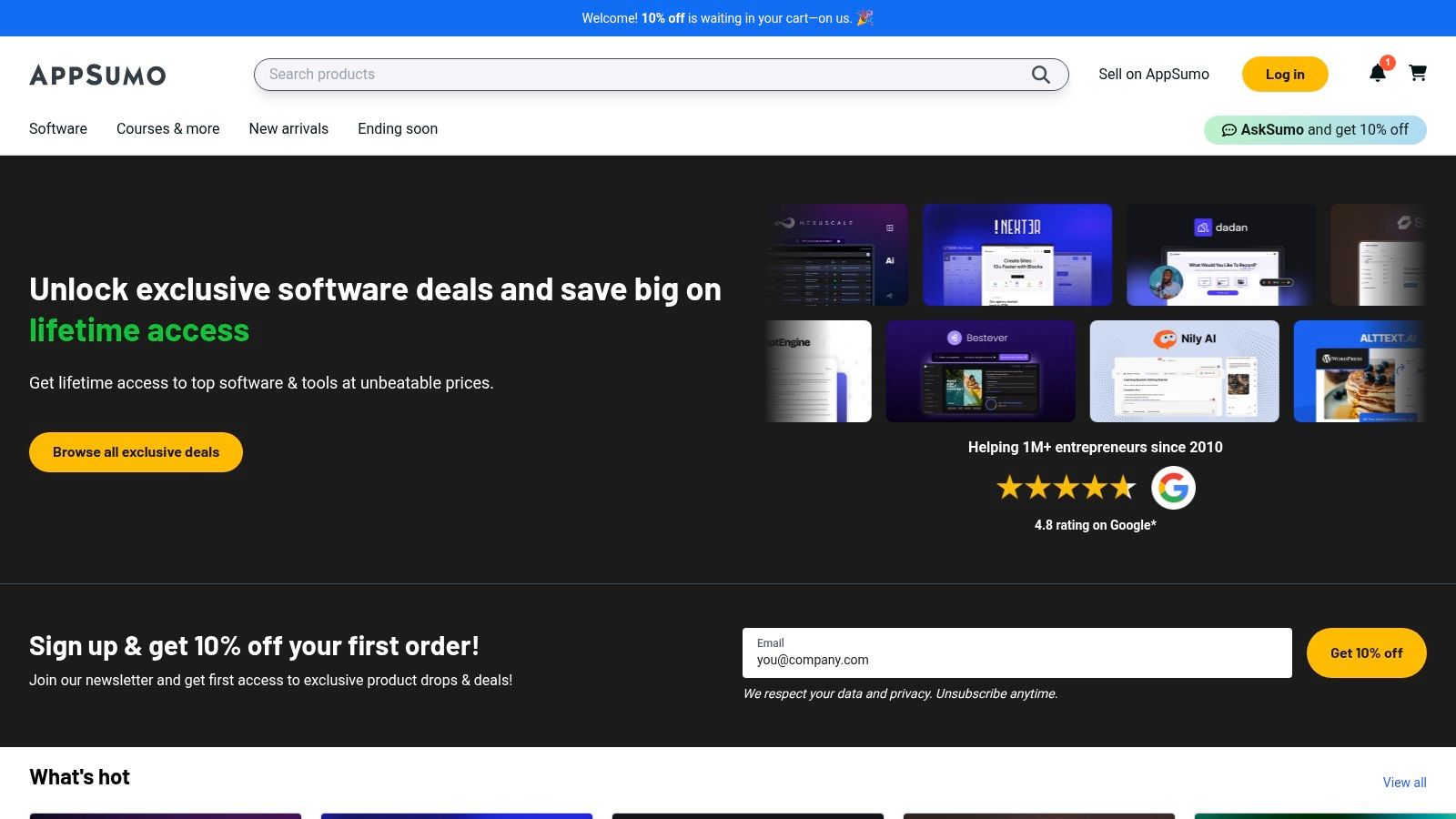
Why It’s a Top Tool for Agencies
AppSumo’s core value lies in risk reduction and cost efficiency. The generous refund window (typically 60 days) allows agencies to thoroughly test a tool with client workflows before fully committing. It's an excellent way to acquire powerful, specialized marketing tools for agencies that might otherwise be out of budget, enabling you to offer more value to clients without inflating overhead costs.
Key Features:
- Lifetime Deals: Pay once to get lifetime access to a wide array of marketing software.
- Rotating Marketplace: New deals on SEO, email, AI, and analytics tools are added weekly.
- Community Reviews & Q&A: Leverage real user feedback to make informed purchasing decisions.
- Generous Refund Policy: Most deals come with a 60-day money-back guarantee for risk-free trials.
Our Take:
The primary risk is that some early-stage companies may pivot, change their feature set, or fail after the deal ends. Additionally, LTDs often lack the enterprise-grade support of established SaaS providers. However, for agencies willing to pilot new technology, AppSumo is an unparalleled resource for building a powerful and affordable software arsenal.
Website: https://appsumo.com
12. G2 – Marketing Software Category
While not a marketing tool itself, G2’s Marketing Software Category is an indispensable research platform for agencies. It functions as a vast, user-powered encyclopedia of technology, allowing you to vet potential tools for client campaigns based on thousands of verified, real-world reviews. Instead of relying on vendor marketing copy, you can see how a tool actually performs for businesses of a similar size and industry.
For an agency, this resource is crucial for due diligence. Before investing in a new platform or recommending one to a client, you can compare features side-by-side, read in-depth reviews about implementation and support, and gauge overall market sentiment. This helps de-risk technology decisions and ensures you're selecting the best marketing tools for your agency and your clients' specific needs.
Why It’s a Top Tool for Agencies
G2 excels at providing a transparent, unbiased look at the software landscape. Its detailed filtering options allow agencies to narrow down choices by company size, user satisfaction, and specific features, quickly creating shortlists of viable options. The Grid reports and comparison tools offer a clear visual snapshot of how different platforms stack up against each other in terms of market presence and user satisfaction.
Key Features:
- Verified User Reviews: Access authentic feedback on performance, usability, and customer support.
- Software Comparison: Place up to four products side-by-side to compare features, pricing, and ratings.
- Grid Reports: Visualize market leaders and high-performers within specific software categories.
- Detailed Filtering: Shortlist tools based on business size, industry, region, and required features.
Our Take:
While some pricing information can be outdated or vendor-supplied, G2's sheer volume of fresh user reviews makes it an essential first stop in any software evaluation process. It's the best way to get an honest assessment of a tool's strengths and weaknesses before committing your agency's or a client's budget.
Website: https://www.g2.com/categories/marketing
Marketing Tools Feature & Pricing Overview
| Product | Core Features/Capabilities | User Experience & Quality ★ | Value & Pricing 💰 | Target Audience 👥 | Unique Selling Points ✨ |
|---|---|---|---|---|---|
| LeadSavvy Pro 🏆 | Real-time Facebook Lead Form sync, built-in CRM | Intuitive UI, email alerts ★★★★☆ | Free plan, affordable upgrades 💰 | SMBs, marketers, agencies, startups 👥 | Auto-sync to Sheets/CRM, video tutorial, mobile |
| HubSpot – Marketing Hub | CRM, visual marketing automation, multi-touch | Mature, detailed reporting ★★★★☆ | Per seat/contact, pricey tiers 💰 | Multi-stakeholder teams, agencies 👥 | Robust partner ecosystem, comprehensive tools |
| Semrush | SEO toolkit, PPC research, agency reporting | Powerful but complex ★★★☆☆ | Modular add-ons increase cost 💰 | Agencies, SEO/PPC pros 👥 | End-to-end marketing suite, white-label options |
| Ahrefs | Backlink index, keyword/content research, audits | Reliable data and site crawling ★★★★☆ | Per-user pricing 💰 | SEO professionals, agencies 👥 | Top backlink data, AI audit, rank tracking |
| Sprout Social | Social media publishing, engagement, analytics | Clean UI, strong collaboration ★★★★☆ | Seat-based pricing 💰 | Social teams, agencies 👥 | Cross-network scheduling, AI assistance |
| Google Marketing Platform | Tag Manager, GA4, Display & Video 360 | Powerful but steep learning curve ★★★ | Free entry, enterprise paid tiers 💰 | Enterprises, advanced marketers 👥 | Deep Google Ads/data integration |
| Meta Business Suite & Ads | FB/IG asset management, Ads Manager, lead gen | Official tool, granular controls ★★★★ | No platform fee, ad spend varies 💰 | Facebook/Instagram advertisers 👥 | Native Meta integration, latest ad formats |
| Mailchimp | Email campaigns, automation, lightweight CRM | Easy deployment, scalable ★★★★☆ | Audience-based pricing 💰 | SMBs, agencies, email marketers 👥 | Drag-drop builder, multivariate testing |
| Canva for Teams | Brand kits, AI image/video tools, collaboration | Fast asset creation, easy to use ★★★★☆ | User-minimum pricing 💰 | Agencies, social/ads teams 👥 | Magic Studio AI, extensive templates |
| Zapier | No-code workflow automation, multi-step logic | Broad integration but some issues ★★★ | Task-based pricing 💰 | Agencies, multi-tool users 👥 | Massive app catalog, team collaboration |
| AppSumo | SaaS deals marketplace, lifetime access offers | Good value but variable product support ★★★ | One-time deal pricing 💰 | Agencies, budget-conscious buyers 👥 | Lifetime deals, wide marketing tool selection |
| G2 – Marketing Software Cat | Software reviews, comparisons, user ratings | Comprehensive, user-driven ★★★★☆ | Free access | All marketing buyers 👥 | Extensive software listings, user reviews |
Building a Cohesive and Future-Proof Agency Tech Stack
Navigating the vast landscape of marketing tools for agencies can feel overwhelming, but the journey from a fragmented toolkit to a streamlined, powerful tech stack is a game-changer. As we've explored, tools like HubSpot and Semrush provide a foundational framework, while platforms like Sprout Social and Canva for Teams address critical, specialized functions. The ultimate goal isn't to acquire the most tools; it's to build a cohesive ecosystem where each component enhances the others.
The true power of an agency's tech stack lies in its integration. Think of how Zapier acts as the central nervous system, connecting a new lead captured via LeadSavvy Pro on Facebook directly to a client’s CRM and triggering a welcome sequence in Mailchimp. This level of automation eliminates manual data entry, reduces the margin for error, and allows your team to focus on high-value strategic work rather than repetitive tasks. A well-integrated stack transforms your agency from a service provider into an efficient, results-driven machine.
Key Takeaways for Assembling Your Agency's Toolkit
Building the perfect tech stack is an ongoing process of evaluation and refinement, not a one-time setup. To guide your decisions, keep these core principles at the forefront:
- Prioritize a Central Hub: Select a "source of truth" for client data, like HubSpot's Marketing Hub. This centralizes information and ensures every team member, from sales to account management, is working with the same data set.
- Balance All-in-Ones with Specialists: While comprehensive platforms like Google Marketing Platform offer immense value, don't shy away from best-in-class specialists. Ahrefs, for example, provides a depth of SEO data that broader platforms may not match.
- Focus on Scalability: Choose tools that can grow with you and your clients. Consider per-user pricing, feature tiers, and the ability to handle an increasing volume of accounts without a significant drop in performance.
- Embrace Experimentation: Marketplaces like AppSumo and review aggregators like G2 are invaluable for discovering emerging tools that can provide a competitive edge. Don't be afraid to pilot new software with a single client or internal project before a full rollout.
Your Actionable Path Forward
Translating this knowledge into action requires a structured approach. Start by auditing your current subscriptions. Are there redundancies? Are you paying for features you don't use? This audit will reveal immediate opportunities for optimization and cost savings.
Next, map out your core agency workflows, from client onboarding to final reporting. Identify the bottlenecks and manual processes that consume the most time. This is where you should focus your initial investment. For instance, if lead handoff is a consistent point of friction, a tool designed for instant, reliable lead notifications becomes a top priority.
Finally, remember that your tech stack is an extension of your agency's brand and capabilities. As you grow, your needs will evolve. A truly comprehensive and future-proof tech stack for marketing agencies often extends beyond direct campaign management to encompass specialized areas like brand monitoring and online presence. Staying informed on the best online reputation management tools and other niche solutions ensures you can offer a holistic service portfolio that meets modern client demands. A thoughtful, strategic selection of marketing tools for agencies isn't just an internal investment; it's a powerful asset that directly translates to client retention and business growth.
Ready to eliminate the delay between lead generation and client action? LeadSavvy Pro bridges the critical gap in your marketing stack by delivering Facebook Lead Ad notifications instantly where your team works. Equip your agency and your clients with the speed to convert by exploring LeadSavvy Pro today.

